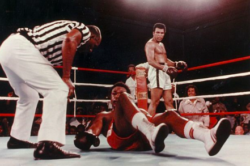The Intersection of Sports and Human Rights: From Kinshasa to Qatar
By: Samuel Smith

Source : BBC Pictures
Under the light of a half moon, 60,000 people gather in the humid night air at the Stade du Mai 20 in the Zairian capital, Kinshasa. Across the globe, another one billion spectators tune their television sets, preparing for the greatest boxing match in the history of the sport. Underdog and fan favourite, Muhammad Ali, prepares to take on World Heavyweight Champion, George Foreman.
The excitement built to a crescendo as Muhammad Ali bounced into the ring. What followed was a display of sporting prowess that has gone down in history. Ali outmanoeuvred his larger opponent, leaning on the ropes and absorbing punches to his arms and body, before striking back with blows to Foreman’s face. The fatal blow came in the eighth round. Foreman fell to the ground as Ali towered over him, an image which has gone down in history and defined a generation.
Whilst Ali was the centre of attention that night, the portrait of a very different man could be seen dominating the Zairian skyline. The image of Mobutu Sese Seko - in his rounded glasses and iconic leopard print hat - looked over the stadium as a reminder of who had bought such a historic event to the streets of Kinshasa. Mobutu had ruled Zaire (the Congo before 1971) as its dictator since 1965, reinventing the nation in his own image. His authoritarian rule was defined by corruption, exploitation and, above all, widespread human rights abuses. Critics of Mobutu and his regime would regularly disappear, never to be seen again.
It was Mobutu who bought the greatest fight in history to Zaire, personally spending $10 million of the wealth he had accumulated through the exploitation of his population to provide the winnings for the fight. Whilst Zairians who failed to align themselves with Mobutu and his government continued to be targeted and eradicated, Mobutu met with American businessmen in Gbadolite, his private palace, offering extravagant gifts to keep them onside. In effect, Mobutu bought silence through financial coercion. Despite it being well known that Mobutu was committing atrocities against his own population, objections to the fight were relatively muted.
A generation later, corruption, exploitation and human rights abuses are once again watch words at a major sporting event. It is well known that the Qatari bid for the 2022 World Cup was fraught with corruption. Furthermore, since the bid proved successful, widespread human rights violations committed against migrant workers, contracted to build stadia across the country, have been uncovered. Once again, a global sporting event has intersected with human rights violations.
The World Cup should have never been given to Qatar. Not only has the astronomical task of building sufficient infrastructure to host the tournament led to well-documented abuses of migrant workers amounting to slave labour, but the nation’s draconian laws against homosexuality directly contradict FIFA’s proclaimed “football for all” ethos.
Now that the World Cup in Qatar is going ahead, it raises questions as to the best method to hold the Qatari authorities accountable for their human rights abuses. Some call for a public boycott of the World Cup, arguing that watching it is endorsing the Qatari regime and their human rights abuses. There is certainly truth to this claim, but does a boycott do anything to hold Qatar accountable for human rights abuses? A counter-argument is that the boycott is too late in the day; with Qatar having spent 12 years building stadia on the back of slave labour. Furthermore, a boycott may starve the tournament of financial support, but is money an issue for a Qatari regime which has already spent over $200 million (£163 million) preparing for the event? A boycott does very little to effect change on the ground – migrant workers will continue to be abused and human rights will continue to be applied selectively.
Instead, this World Cup should be seen as an opportunity for human rights activists to educate populations across the globe on the modern-day human rights abuses which are too often swept under the rug. Whilst a boycott may cause the World Cup to fade into mediocrity, it does nothing to hold the Qatari authorities accountable for the lost lives of migrant workers. Now is the time to be vocal. This tournament should be viewed as an opportunity to call out governments which fail in their responsibility to protect the basic human rights of their populations.
The international attention bought to Qatar by the World Cup can be used as leverage to pragmatically effect change in the nation. Already, the pressures of hosting such a global event have forced Qatar into labour reforms which, whilst severely limited, have seen a step in the right direction to improving conditions for labourers. The long-term impact remains to be seen, but it is only by engaging with nations failing to uphold human rights that we can expect to improve them.
